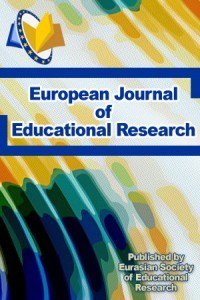Learning Styles as the Predictor of Academic Success of the Pre-Service History Teachers
Learning Styles as the Predictor of Academic Success of the Pre-Service History Teachers
: Learning style, academic achievement, history pre-service teachers, history education history teaching,
___
- Arslangilay, S. (2015). Ogrenme ve ogretim stilleri [Learning and Teaching Styles]. In: S. Guven & M. A. Ozerbas (ed.) Ogretim ilke ve yontemleri [Teaching principles and methods], (pp.59-107). Ankara: Pegem Akademi Yayinlari.
- Ata, B. (2009). Tarih derslerinde yerel tarih, muze ve oren yerlerinin kullanimi [Use of local history, museums and places in history lessons]. In: M. Demirel & I. Turan (ed.) Tarih ogretim yontemleri [History teaching methods], (pp.113-128). Ankara: Nobel Yayinlari.
- Aydemir, H., Kocoglu, E., & Karali, Y. (2016). Grasha-Reichmann olcegine gore ogretmen adaylarinin ogrenme stillerinin degerlendirilmesi [Grasha-Reichmann Scale Evaluation of Learning Styles by Teacher Candidates]. Kastamonu Education Journal, 24(4). 1881-1896.
- Bayir, E. A. (2007). Ogrenme stillerine gore yapilandirilan ogrenen kontrolunun ogrenci basarisina ve ogrenmenin kaliciligina etkisinin incelenmesi [Effect of the learner control contructed with learning style to the success of students and the permanency of learning] (Published Master’s thesis). Gazi Universitesi, Ankara.
- Bilgin, I., & Bahar, M. (2008). Sinif ogretmenlerinin ogretme ve ogrenme stilleri arasindaki iliskinin incelenmesi. [Investigation of the Relationship Between Teaching and Learning Styles of Primary School Teachers], Gazi University Journal of Gazi Educational Faculty, 28(1). 19-38.
- Buyukozturk, S., Cakmak, E.K., Akgun, O.E., Karadeniz, S., & Demirel. (2010). Bilimsel arastirma yontemleri [Scientific research methods]. Ankara: Pegem Akademi Yayinlari.
- Bozkurt, N. (2013). An Examination of the Links between Pre-service Teacher's Metacognitive Level, Learning Styles and their Achievement of History Class. Procedia-Social and Behavioural Sciences, 93, 1634-1640.
- Dilek, D. (2007). Tarih derslerinde ogrenme ve dusunce gelisimi [Learning and thinking development in history lessons]. Ankara: Nobel Yayinlari.
- Gokce, F. (2014). Sinifta ogrenme ve ogretme surecinin yonetimi [Management of the teaching and learning process]. Ankara: Pegem Akademi Yayinlari.
- Gozutok, D. (2011). Ogretim ilke ve yontemleri [Teaching principles and methods]. Ankara: Ekinoks Yayinlari.
- Grasha, A. F. (2002). Teaching with style: A practical guide to enhancing learning by understanding teaching and learning styles. Alliance Pub.
- Inal, A. (2013). 9. sinif kimya dersi kimyasal baglar konusunun ogrencilerin ogrenme stilleri ve geleneksel ogretim yaklasimi ile islenmesinin ogrenci akademik basarisina etkisinin tespit edilmesi [Determining the effects of teaching chemical bonds subject of 9th class with learning styles and traditional learning approach to a students'academic achievement] (Published PhD Thesis). Gazi Universitesi, Ankara.
- Kabapinar, Y. (2014). Kuramdan uygulamaya sosyal bilgiler ogretimi [Teaching social studies from theory to practice]. Ankara: Pegem Akademi Yayinlari.
- Karakuyu, Y., & Tortop, H. S. (2010). Ogretmen adaylarinin ogrenme stillerinin fizik dersine yonelik tutum ve basarilarina etkisi.[ Effect of the Pre-Service Teachers’ Learning Styles On Physics Achievement and Attitudes]. Afyon Kocatepe University Journal of Science and Engineering, 10(1), 47-55.
- Kottler, E., & Gallavan N.P. (2013). Sosyal bilgiler ogretiminde basarinin sirlari [The secrets of success in teaching social studies]. (S. B. Demir, Trans.), Ankara: Egiten Kitap.
- McCarthy, J. P., & Anderson, L. (2000). Active learning techniques versus traditional teaching styles: Two experiments from history and political science. Innovative Higher Education, 24(4), 279-294
- Ozturk, I. H. (2012). Ogretim materyalllerinin secimi ve kullanimini etkileyen faktorler [Factors affecting the choice and use of teaching materials. In: I. H. Demircioglu & I. Turan (ed.) Tarih ogretiminde ogretim teknolojileri ve materyal tasarimi [History techniques and material design in history teaching], (pp.13-27). Ankara: Pegem Akademi Yayinlari.
- Pallant, J. (2016). SPSS kullanma klavuzu-SPSS ile adim adim veri analizi [SPSS survival a step by step guide to data analysis using ibm spss] (S. Balci, & B. Ahi, Trans.). Ankara: Ani Yayincilik
- Saritas, E. & Sural, S. (2010). Grasha-Reichman ogrenme ve ogretme stili olceklerinin Turkce uyarlama calismasi [Grasha-reichmann learning and teaching style of the scale study Turkish adaptation], E-Journal of New World Academy, 5(4), 2162-2177.
- Seker, M., & Yilmaz, K. (2011). Sosyal bilgiler ogretiminde ogrenme stillerinin kullanilmasinin ogrencilerin ogrenme duzeyleri uzerindeki etkisinin incelenmesi [investigation into the effects of the use of learning styles on students’ learning levels in social studies teaching]. Kastamonu Education Journal, 19(1), 251-266.
- Sidekli, S. & Akdogdu, E. (2018). Ogrenme stillerinin sinif ogretmeni adaylarinin akademik basarilarini yordama gucu[Predictive Power of Learning Styles on Primary School Pre-service Teachers’ Academic Achievement]. Hacettepe University Journal of Education, 33(2), 503-517.
- Sonmez, V., & Alacapinar, F. G. (2016). Orneklendirilmis bilimsel arastirma yontemleri [Scientific research methods with examples]. Ankara: Ani Yayincilik.
- Topuz, F. G. & Karamustafaoglu, O. (2013). Ogrenme stillerinin cesitli degiskenler acisindan incelenmesi: fen bilgisi ogretmen adaylari. [Investigation of Learning Styles according to Some Variables: Prospective Science Teachers] Dicle University Journal of Ziya Gokalp Faculty of Education, 21, 30-46.
- Turan, I. (2009). Tarih derslerinde temel ogretim yontemlerinin kullanimi [Use of basic teaching methods in history lessons]. In: M. Demirel & I. Turan (ed.) Tarih ogretim yontemleri [History teaching methods] (pp.27-50). Ankara: Nobel Yayinlari.
- Tuysuz, C., & Tatar, E. (2008). Ogretmen adaylarinin ogrenme stillerinin kimya dersine yonelik tutum ve basarilarina etkisi [Effect of the Pre-Service Teachers' Learning Styles On Chemistry Achievement and Attitudes], Mustafa Kemal University Journal of Social Sciences Institute, 5(9), 97- 107.
- ISSN: 2165-8714
- Başlangıç: 2012
- Yayıncı: Eurasian Society of Educational Research
Regular and Special Education Mexican Teachers’ Attitudes toward School Inclusion and Disability
Yanko Norberto MEZQUİTA-HOYOS, Miriam Hildegare SANCHEZ-MONROY, Guadalupe Elizabeth MORALES-MARTİNEZ, Ernesto Octavio LOPEZ-RAMİREZ, Maria Del Roble REYNA-GONZALEZ
Busra BAKİOGLU, Orhan KARAMUSTAFAOGLU, Sevilay KARAMUSTAFAOGLU, Senay YAPİCİ
Sinem DİNCOL OZGUR, Ayhan Yilmaz
A Review of Articles that Include the Schools’ Readiness Dimension
The Relationship between Learning Styles of Pre-Service Music Teachers and Academic Achievement
Serkan DEMİRTAS, Hatice ONURAY EGİLMEZ
Learning Styles as the Predictor of Academic Success of the Pre-Service History Teachers
Mehtap TEKDEMİR EROGLU, Duygu HARMANDAR DEMİREL
Empathic Tendencies of Pre-Service Physical Education and Sports Teachers
